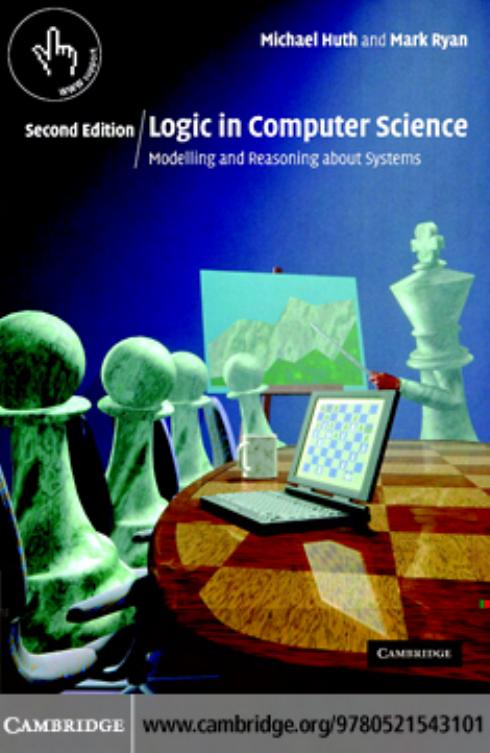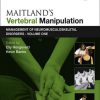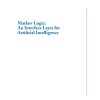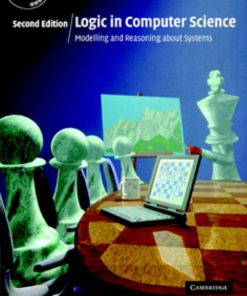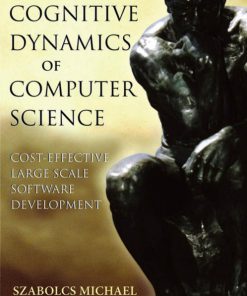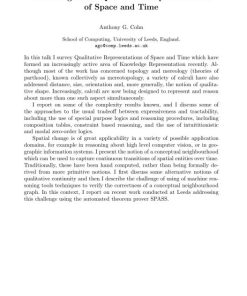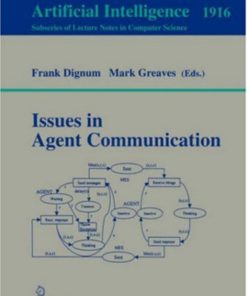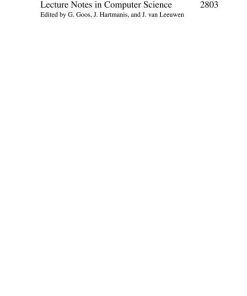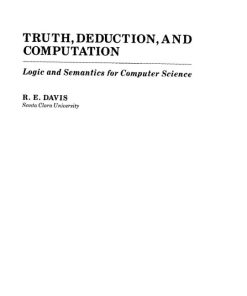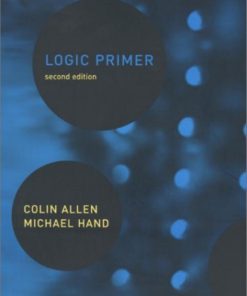Logic in Computer Science Modelling and Reasoning about Systems 2nd Edition by Michael Huth, Mark Ryan ISBN 0511261586 9780511261589
$50.00 Original price was: $50.00.$25.00Current price is: $25.00.
Authors:Logic in computer science modelling; reasoning about systems-Cambridge University Press (2004) , Author sort:modelling, Logic in computer science & Press, reasoning about systems-Cambridge University
Logic in Computer Science: Modelling and Reasoning about Systems 2nd Edition by Michael Huth, Mark Ryan – Ebook PDF Instant Download/Delivery. 0511261586, 9780511261589
Full download Logic in Computer Science: Modelling and Reasoning about Systems 2nd Edition after payment
Product details:
ISBN 10: 0511261586
ISBN 13: 9780511261589
Author: Michael Huth, Mark Ryan
Logic in Computer Science: Modelling and Reasoning about Systems 2nd Edition:
Recent years have seen the development of powerful tools for verifying hardware and software systems, as companies worldwide realise the need for improved means of validating their products. There is increasing demand for training in basic methods in formal reasoning so that students can gain proficiency in logic-based verification methods. The second edition of this successful textbook addresses both those requirements, by continuing to provide a clear introduction to formal reasoning which is both relevant to the needs of modern computer science and rigorous enough for practical application. Improvements to the first edition have been made throughout, with extra and expanded sections on SAT solvers, existential/universal second-order logic, micro-models, programming by contract and total correctness. The coverage of model-checking has been substantially updated. Further exercises have been added. Internet support for the book includes worked solutions for all exercises for teachers, and model solutions to some exercises for students.
Logic in Computer Science: Modelling and Reasoning about Systems 2nd Edition Table of contents:
-
1 Propositional logic
- 1.1 Declarative sentences
- 1.2 Natural deduction
- 1.2.1 Rules for natural deduction
- 1.2.2 Derived rules
- 1.2.3 Natural deduction in summary
- 1.2.4 Provable equivalence
- 1.2.5 An aside: proof by contradiction
- 1.3 Propositional logic as a formal language
- 1.4 Semantics of propositional logic
- 1.4.1 The meaning of logical connectives
- 1.4.2 Mathematical induction
- 1.4.3 Soundness of propositional logic
- 1.4.4 Completeness of propositional logic
- 1.5 Normal forms
- 1.5.1 Semantic equivalence, satisfiability and validity
- 1.5.2 Conjunctive normal forms and validity
- 1.5.3 Horn clauses and satisfiability
- 1.6 SAT solvers
- 1.6.1 A linear solver
- 1.6.2 A cubic solver
- 1.7 Exercises
- 1.8 Bibliographic notes
-
2 Predicate logic
- 2.1 The need for a richer language
- 2.2 Predicate logic as a formal language
- 2.2.1 Terms
- 2.2.2 Formulas
- 2.2.3 Free and bound variables
- 2.2.4 Substitution
- 2.3 Proof theory of predicate logic
- 2.3.1 Natural deduction rules
- 2.3.2 Quantifier equivalences
- 2.4 Semantics of predicate logic
- 2.4.1 Models
- 2.4.2 Semantic entailment
- 2.4.3 The semantics of equality
- 2.5 Undecidability of predicate logic
- 2.6 Expressiveness of predicate logic
- 2.6.1 Existential second-order logic
- 2.6.2 Universal second-order logic
- 2.7 Micromodels of software
- 2.7.1 State machines
- 2.7.2 Alma – re-visited
- 2.7.3 A software micromodel
- 2.8 Exercises
- 2.9 Bibliographic notes
-
3 Verification by model checking
- 3.1 Motivation for verification
- 3.2 Linear-time temporal logic
- 3.2.1 Syntax of LTL
- 3.2.2 Semantics of LTL
- 3.2.3 Practical patterns of specifications
- 3.2.4 Important equivalences between LTL formulas
- 3.2.5 Adequate sets of connectives for LTL
- 3.3 Model checking: systems, tools, properties
- 3.3.1 Example: mutual exclusion
- 3.3.2 The NuSMV model checker
- 3.3.3 Running NuSMV
- 3.3.4 Mutual exclusion revisited
- 3.3.5 The ferryman
- 3.3.6 The alternating bit protocol
- 3.4 Branching-time logic
- 3.4.1 Syntax of CTL
- 3.4.2 Semantics of computation tree logic
- 3.4.3 Practical patterns of specifications
- 3.4.4 Important equivalences between CTL formulas
- 3.4.5 Adequate sets of CTL connectives
- 3.5 CTL and the expressive powers of LTL and CTL
- 3.5.1 Boolean combinations of temporal formulas in CTL
- 3.5.2 Past operators in LTL
- 3.6 Model-checking algorithms
- 3.6.1 The CTL model-checking algorithm
- 3.6.2 CTL model checking with fairness
- 3.6.3 The LTL model-checking algorithm
- 3.7 The fixed-point characterisation of CTL
- 3.7.1 Monotone functions
- 3.7.2 The correctness of SATEG
- 3.7.3 The correctness of SATEU
- 3.8 Exercises
- 3.9 Bibliographic notes
-
4 Program verification
- 4.1 Why should we specify and verify code?
- 4.2 A framework for software verification
- 4.2.1 A core programming language
- 4.2.2 Hoare triples
- 4.2.3 Partial and total correctness
- 4.2.4 Program variables and logical variables
- 4.3 Proof calculus for partial correctness
- 4.3.1 Proof rules
- 4.3.2 Proof tableaux
- 4.3.3 A case study: minimal-sum section
- 4.4 Proof calculus for total correctness
- 4.5 Programming by contract
- 4.6 Exercises
- 4.7 Bibliographic notes
-
5 Modal logics and agents
- 5.1 Modes of truth
- 5.2 Basic modal logic
- 5.2.1 Syntax
- 5.2.2 Semantics
- Equivalences between modal formulas
- Valid formulas
- 5.3 Logic engineering
- 5.3.1 The stock of valid formulas
- 5.3.2 Important properties of the accessibility relation
- 5.3.3 Correspondence theory
- 5.3.4 Some modal logics
- 5.4 Natural deduction
- 5.5 Reasoning about knowledge in a multi-agent system
- 5.5.1 Some examples
- 5.5.2 The modal logic KT45n
- 5.5.3 Natural deduction for KT45n
- 5.5.4 Formalising the examples
- 5.6 Exercises
- 5.7 Bibliographic notes
-
6 Binary decision diagrams
- 6.1 Representing boolean functions
- 6.1.1 Propositional formulas and truth tables
- 6.1.2 Binary decision diagrams
- 6.1.3 Ordered BDDs
- 6.2 Algorithms for reduced OBDDs
- 6.2.1 The algorithm reduce
- 6.2.2 The algorithm apply
- 6.2.3 The algorithm restrict
- 6.2.4 The algorithm exists
- 6.2.5 Assessment of OBDDs
- 6.3 Symbolic model checking
- 6.3.1 Representing subsets of the set of states
- 6.3.2 Representing the transition relation
- 6.3.3 Implementing the functions…
- 6.3.4 Synthesising OBDDs
- 6.4 A relational mu-calculus
- 6.4.1 Syntax and semantics
- 6.5 Exercises
- 6.6 Bibliographic notes
- 6.1 Representing boolean functions
People also search for Logic in Computer Science: Modelling and Reasoning about Systems 2nd Edition:
boolean logic in computer science
what is digital logic in computer science
digital logic in computer science pdf
propositional logic in computer science
formal logic in computer science
You may also like…
eBook DJVU
Computer Simulation in Management Science 5th Edition by Michael Pidd ISBN 0470092300 9780470092309

